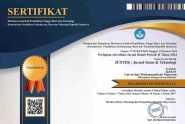Linear Shaker Sebagai alat Laboratorium untuk Penghomogen Sampel
Abstract
Abstract: This study aims to design, construct, and evaluate a prototype Arduino Uno–based Linear Shaker that integrates a moving rail with bearing mechanism, an optocoupler sensor for real-time RPM feedback, and a Nextion LCD interface for speed and duration control. A Research and Development (R&D) methodology was employed, comprising field observations, literature review, device design, prototype fabrication, performance testing without load and with liquid loads (50–600 g), and performance data analysis. No-load testing demonstrated an average RPM measurement accuracy of 96 %, while loaded tests showed the prototype maintained stable rotations in the 100–129 RPM range across the tested load spectrum. The device also achieved continuous operation for up to 60 minutes without significant performance degradation. These results confirm that the Linear Shaker meets the targeted performance for light laboratory applications and provide a foundation for future enhancements, such as adopting a higher-torque stepper motor and upgrading the motion guide system with high-quality bearings to further increase load capacity and agitation efficiency.
Abstrak: Penelitian ini bertujuan untuk merancang, membangun, dan mengevaluasi prototipe Linear Shaker berbasis Arduino Uno yang mengombinasikan mekanisme rel gerak dengan bearing, sensor optocoupler untuk pembacaan RPM real-time, serta antarmuka Nextion LCD untuk pengaturan kecepatan dan durasi agitasi. Metode penelitian menggunakan pendekatan Research and Development (R&D) yang meliputi observasi lapangan, studi pustaka, perancangan alat, pembuatan prototipe, pengujian kinerja tanpa beban dan dengan beban cairan (50–600 g), serta analisis data performa. Pengujian tanpa beban menunjukkan rata-rata akurasi pembacaan RPM mencapai 96 %, sedangkan pada pengujian beban, prototipe mempertahankan putaran stabil di kisaran 100–129 RPM dengan variasi beban yang diuji. Durasi operasi hingga 60 menit juga tercapai tanpa penurunan signifikan dalam performa. Hasil penelitian mengonfirmasi keberhasilan desain Linear Shaker dalam memenuhi target kinerja laboratorium ringan, sekaligus memberikan pijakan bagi pengembangan lebih lanjut, seperti penggunaan motor stepper berdaya lebih tinggi dan peningkatan sistem rel gerak dengan bearing berkualitas untuk meningkatkan kapasitas dan efisiensi agitasi.
Keywords
Full Text:
PDFReferences
Abrianto, Y. H. (2021). Rancang Bangun Rotor Orbital Shaker Berbasis Arduino Mega dan Motor DC. Universitas Jambi.
Afifah, E. N., & Ekawita, R. (2022). Comparison of Infrared and Optocoupler Sensors Performance for Lab-Scale RPM Measurement System. Indonesian Physical Review, 5(2), 130.
Amri, I., Maharsi, R., Djamal, M., Rajak, A., & Aminah, N. S. (2015). Rancang Bangun Alat Pengocok Bahan Kimia Otomatis (Automatic Chemical Shaker) Berbasis Mikrokontroler ATMega16. Prosiding SKF (Seminar Kontribusi Fisika) 2015, 189–193.
Chen, L., Wang, J., & Liu, S. (2019). Design and Evaluation of a Low-Cost Linear Shaker for Agricultural Laboratories. Journal of Agricultural Engineering Research, 58(2), 112–118.
Dhankani, K. C., & Pearce, J. M. (2017). Open source laboratory sample rotator mixer and shaker. HardwareX, 1, 1–12.
Harfi, A. (2019). Dasar-dasar Alat Shaker. Poltekkes Kemenkes Jakarta II.
Harsoyo, I. T., ABA, M. U. N., Wahyudi, B., & Firmansyach, D. A. (2024). Hotplate Magnetic Stirrer Dilengkapi Pengatur Waktu, Suhu dan Kecepatan Melalui LCD Nextion. Jurnal Teori Dan Aplikasi Fisika, 12(1), 103–112.
Jumardin, J., Ilham, J., & Salim, S. (2019). Studi Karakteristik Minyak Nilam Sebagai Alternatif Pengganti Minyak Transformator. Jambura Journal of Electrical and Electronics Engineering, 1(2), 40–48. https://doi.org/10.37905/jjeee.v1i2.2881
Muskhir, M., Luthfi, A., Ang, Aswardi, A., & Fortuna, A. (2024). Performance Analysis of DC Motors With Integrated Proportional-Integral and Artificial Neural Network Control. TEM Journal, 13(4), 2684–2693.
Nurhasanah, A. (2017). Modifikasi Waterbath Shaker berbasis Mikrokontroler ATMega 8535. Sekolah Tinggi Kesehatan Widya Husada.
Olawale, T. O., & Peters, E. (2020). Integration of Microcontroller-Based Control in Laboratory Shakers. Instrumentation Science & Technology, 48(1), 23–31.
Ramadan, A. (2020). Rancang Bangun Sistem Kendali Motor Stepper pada Prototype Mesin Plotter Sederhana Berbasis Arduino Uno. Universitas Muhammadiyah Malang.
Roch, M. R., & Martina, M. (2022). VirtLAB: A Low-Cost Platform for Electronics Lab Experiments†. Sensors, 22(13). https://doi.org/10.3390/s22134840
Rodriguez, G., Anderlei, T., Micheletti, M., Yianneskis, M., & Ducci, A. (2014). On the measurement and scaling of mixing time in orbitally shaken bioreactors. Biochemical Engineering Journal, 82, 10–21.
Rosadi, A., Manurung, P., Yulianti, Y., Marjunus, R., & Junaidi. (2024). Desain dan Realisasi Sistem Kontrol Kecepatan dan Ketinggian Motor Menggunakan Sensor Optocoupler dan Sensor Ultrasonik Berbasis Arduino untuk Aplikasi Pengaduk Otomatis. Jurnal Teori Dan Aplikasi Fisika, 12(1), 1–10.
Safitri, M., Iswara, W. D., & Harjono, T. (2020). Blood Bag Shaker Dilengkapi Pemilihan Kecepatan Motor. Medika Teknika : Jurnal Teknik Elektromedik, 1(2), 44–51. https://doi.org/https://doi.org/10.18196/mt.010208
Septiani, E. (2023). Rancang Bangun Alat Shaker Dengan Input Menggunakan Keypad Berbasis Arduino. Universitas Lampung.
Tondi, H. (2019). Rancang Bangun Mesin Ekstruder Filament 3D Print. Universitas Islam Indonesia Yogyakarta.
Vicias, I. A., Pauzi, G. A., Ayu, H. R., & Suciyati, S. W. (2024). Production of an Orbital Shaker Device with Time and Rotational Speed Control Using Potentiometer Based on Arduino Uno. Journal of Energy,Material,and Instrumentation Technology, 5(1), 17–27. https://doi.org/https://doi.org/10.23960/jemit.v5i1.219
Wicaksnono, K. S. (2021). Rancang Bangun dan Simulasi 3D Printer Model Cartesian Berbasis Fused Deposition Modelling. Universitas Tanjungpura.
Wijaya, R. B. (2017). Incubator Shaker Berbasis Mikrokontroler ATMega 328. Sekolah Tinggi Kesehatan Widya Husada.
DOI: https://doi.org/10.31764/justek.v8i2.31015
Refbacks
JUSTEK : Jurnal Sains dan Teknologi sudah terindeks
EDITORIAL OFFICE:












.JPG)

